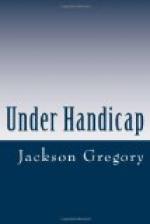No one had seen him. There were no eyes for him. A very few stragglers moved unsteadily here and there; the great majority of the men were packed in a mass about the barrel. Tin cups, dippers, even buckets and pans ran from hand to hand, from those nearest the wagon to the clamorous fellows upon the outskirts of the crowd, spilling the liquor freely as they were jolted and jostled.
This his eyes took in at a quick glance. Then he saw that fifty yards from the group of men there was another wagon which had been drawn aside with its four empty barrels. Walking slowly now, the rifle held vertically close to the side which was turned away from them, he moved toward this second wagon. He reached it, attracting no attention. Springing into its low bed, he dragged the four barrels close together. The broadside of the wagon was turned toward the clamorous crowd. Keeping his body hidden behind the bulwark he had made, he watched and waited for more light.
Slowly the pale glow in the east lengthened and broadened and brightened. Once Conniston lifted his rifle quickly to see if he could find the sights. It was still too dark for quick, accurate work.
So again he waited. A strange, cool calmness had succeeded to his almost frenzied agitation of a moment ago. He knew the danger of the thing which he was about to do; he knew and realized clearly what he might be called upon to do in self-protection alone when once he had taken his stand. But there was no other way; and, no matter what the consequences, no matter what the results, he accepted the only chance which circumstances had left him. And moments of unswerving determination do not make for nervous excitement. It is the anxious uncertainty, like that through which he had just passed, that makes a man’s finger tremble upon the trigger.
Louder and ever louder rose the throaty voices, faster and faster passed the cups and dippers. Ben and Mundy had their arms about each other. In the wagon the Lark had slipped down, and now lay upon his back, staring at the dim, swirling stars and babbling incoherent nothings.
Men sang in strident, raucous, unmusical voices. A swarthy little Italian was playing waltzes upon a harmonica, and heavy-booted feet shuffled and stamped upon the sand as men flung their brawny arms about one another and swayed back and forth. Conniston saw that when a man thrust his arm down into the barrel for a fresh cupful of whisky it did not disappear three inches above the elbow.
Swiftly the desert daylight came. Conniston stooped and tied his boot-laces, that they might not trip him when he moved. He stood up and whipped his revolver from its holster, spinning the cylinder, and then shoving it back. And then, laying the rifle across the top of one of the barrels, he cleared his throat and called out loudly.
One of the men nearest him heard him above the shouting and pointed him out to another. The two laughed loudly and turned away from him, forgetting him as they turned. Again he called, louder than before. No one heard him, no one looked to him. He waved his hat above his head. If any one saw, no one gave sign of seeing. He licked his lips and lifted the rifle.




